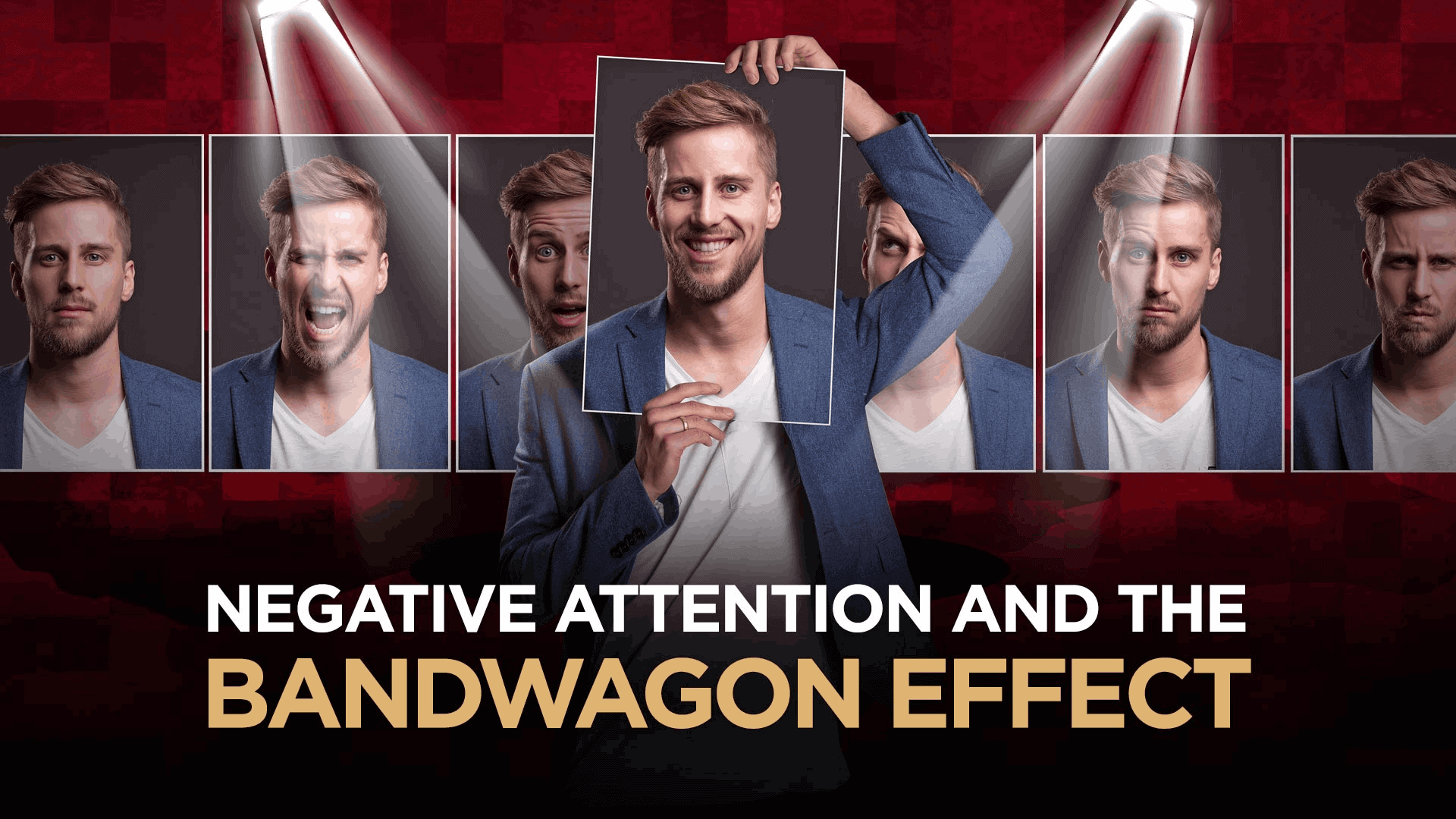Social media influencers have a lot of tricks up their sleeves when it comes to getting more followers, more engagement, more likes, more shares, and more exposure. Figuring out a way to create the bandwagon effect is one of the ways rising influencers gain momentum – but is this a good way to grow your following? Before we get into that, let’s talk about what the bandwagon effect is.
Whenever you do something simply because “everyone else is doing it,” you are shamelessly riding the bandwagon.
The bandwagon effect is a psychological phenomenon characterized by the increase in the probability that an individual will adopt certain beliefs or follow certain trends, simply due to the fact that a large number of other people are doing it.
People will ride the bandwagon in order to follow the crowd. The thing is, they’ll do this even if the crowd’s beliefs oppose their own true beliefs.
When you see that an influencer’s post got a lot of retweets on Twitter, you’ll be more likely to retweet their post. If you notice that most people are cheering for a particular team at a sports event, you’ll be more likely to cheer on that particular team. This is often called “hopping on the bandwagon” or, “jumping on the bandwagon”.

The Bandwagon Effect Requires Social Proof
Without social proof, the bandwagon effect won’t be easily achieved. But what exactly is social proof?
Social proof is based on the concept that human beings tend to follow the actions of the masses, or follow the crowd. We tend to rely on social cues – or social proof – to make our decisions. And, we tend to conform to whatever the majority is doing or thinking.
We tend to rely on social cues to make our decisions, which is why social proof is so important for influencers and brands. Share on X
When deciding what to buy, what to think, and how to act, do you rely too heavily on social cues? Do you look to see how others are reacting, before deciding how you are going to react? Have you noticed a strong desire to conform to whatever seems to be the popular choice or the socially acceptable decision? If so, you’re one of the millions of bandwagoners who make the bandwagon effect work.
When people see social proof that there are a large number of people doing something, or an influential person is doing something, they’re more likely to hop on the bandwagon and join in. Some people call this ‘following the crowd’, others call this the ‘herd mentality’, and others call this ‘riding the bandwagon.’

Examples of Social Proof at Work
If an influencer already has 1 million followers, you’re more likely to want to follow them, right? And if an influencer’s product already has thousands of online reviews, you’ll be more likely to buy it, correct? Similarly, we’re more likely to buy a book on Amazon that has lots of reviews from the public, or has been endorsed by a celebrity. Statistically, 91% of 18-34-year-olds trust online social proof reviews as much as recommendations from someone close to them. We also tend to trust endorsements from public figures.
When you choose to buy a product because a popular social media influencer or a celebrity has endorsed it, that is social proof at work. Similarly, when you choose to sign up for an influencer’s master class because you see that 10,000 people have already signed up, that too is social proof working its magic.
Social proof is also at play when you decide to wait for a table to eat at a busy restaurant, instead of eating at the restaurant next door with plenty of empty tables available. But what if that empty restaurant actually served better food? Why is it that instead of finding out, we’re more likely to follow the crowd?
Relying On Social Proof Indicates Low Self-Esteem and a Desire to Fit In
Your innate desire to fit in with the rest of the crowd affects your purchasing decisions. Your desire to fit in also affects your decision to adopt a particular belief or take a particular action.
Why do so many people refer to how others are reacting, before deciding how to react themselves? The answer could have a lot to do with low self-esteem.

When someone is motivated to fit in with the rest of the crowd, or hesitant to decide their own reaction independent of the reaction of others, does that indicate low self-confidence?
What if your actual desire was the opposite of what the majority of people were doing? Or, what if you thought the decision the masses were making was actually a pretty stupid decision? Would you adopt the herd mentality, and base the validity of that decision on the number of people doing it? We have already established that doing something simply because everyone else is doing it, is the epitome of riding the bandwagon.
In fact, wouldn’t you agree that not doing something that everyone else is doing, requires a high level of self-confidence? To intentionally be the odd one out – to be okay with not fitting in – that, to me, is admirable.
Using Negative Attention to Your Advantage
You’ve probably heard the expression, “All press is good press”, and “There’s no such thing as bad publicity”, right? But is bad press ever really a good thing?
Some influencers think negative attention can be a good thing, and later in this article I’m going to reveal my true thoughts on the matter. But first, let’s discuss whether or not there’s any truth to the concept that “All press is good press”. Is negative attention ever advantageous for influencers?
When you ‘hop on the bandwagon’ by bad-mouthing a public figure on social media, because everyone else is bad-mouthing that public figure, you’re just giving them more exposure and promoting their brand. When a YouTube video goes viral, it’s generally considered a good thing, even if it went viral because people were making fun of it or shaming it.

Influencers are Leveraging ‘Outrage Culture’ and Using ‘Outrage Marketing’ to Get Attention
Outrage culture, also known as call-out culture, is a form of public shaming, popular among millennial social media users. In today’s outrage culture, it’s completely normal for social media users to identify social media posts that are offensive, repost them, and “call out” whoever originally posted it to publicly shame them.
Stirring up controversy is something many influencers do intentionally, to gain exposure in the media, and leverage outrage culture. Some influencers are hoping that what they post will result in a Twitterstorm of absolute outrage. If that’s what it takes to stand out and be noticed, they’re willing to do it, and it becomes part of their influencer marketing strategy.
Stirring up controversy is something many influencers do intentionally, to leverage outrage culture and gain exposure in the media. Share on X
Sheer outrage can be a driving force, and people are inclined to share negative stories and spread the negative virality.

Ryan Holiday, former Director of Marketing for American Apparel said, “What some marketers have realised is that with polarising products and campaigns, they can use the outrage – real or sincere – of their opponents to hijack the media and get attention.”
The question is, is this form of outrage marketing ethical? And let’s say you don’t care about ethics, then let me ask you a different question. It may have worked once or twice, but is this marketing tactic sustainable?
It’s my belief that when outrage marketing becomes more widely understood, people will stop falling for it. It’s therefore certainly not a sustainable marketing tactic. It’s also not typically an ethical one.
You might be wondering why outrage culture has become a thing. The truth is, getting outraged over minor controversy online is a welcome distraction from people’s real problems. It’s also an easier and less thought-provoking outlet for people’s outrage, as compared to getting outraged over real problems such as war, poverty, or violence.
The Masses Project Negative Emotions Onto Social Media Influencers
People project negative emotions onto social media influencers because they function from a lower state of being. They are generally angry, sad, moody or depressed in their own lives, and outrage culture provides them with an outlet to get angry.
Many people tend to be focused on the media’s negative stories, and influencer marketing campaigns take advantage of this knowledge. Like I said earlier, people are inclined to share negative stories and spread negative virality – especially if they themselves are in a bad mood.
Rather than work on improving their own lives, many people would rather call out worse offenders than themselves. This distracts them from their own issues.
Famous Examples of Influencers Who Used Negative Attention to Create a Bandwagon Effect
In recent years, one of the most famous examples of an influencer who used negative attention to her advantage, was Nicole Arbour and her viral video, “Dear Fat People”.
People weren’t really talking about the Canadian comedian Nicole Arbour until she released her YouTube video, “Dear Fat People” which today has amassed over 14 million views on YouTube.
Does it surprise you that it was all a marketing scheme? In an interview with Cosmopolitan, Arbour admitted that “Dear Fat People” was a pre-planned marketing scheme, and that the highly controversial video changed her life financially, as she predicted it would. The short “Dear Fat People” video. She also boasted about film and TV offers that came after that video’s release. “Dear Fat People” launched Arbour’s career, all because of the negative attention it amassed.
Logan Paul is another controversial YouTuber and influencer who has over 20 million subscribers on YouTube.
In late 2017, Paul posted a video which showed a dead body in Japan’s “Suicide Forest,” which spurred outrage online. Paul was accused of making light of suicide. Paul later posted an apology video which garnered over 56 million views, and his following only continued to increase.
Was it all an elaborate marketing scheme? And if so, did it work? As a result of the offensive video, YouTube removed Logan Paul from the Google Preferred program. This of course had a negative effect on his ad revenue.
Paul, however, continued to gain more and more exposure, and make more and more money, despite all of this backlash. People kept buying his online merchandise and kept engaging with him online. This year, he was announced by Business Insider as being one of the world’s highest-paid YouTube stars.
Logan Paul Says His Haters React Exactly How He Wants Them to React
What does Logan Paul have to say about this? “I bank on the naivety of old people and millennials, to perpetuate my brand, make me go viral and keep me relevant,” Paul recently told his podcast, ImPaulsive, later explaining that he has earned hundreds of thousands of dollars, “Because of the haters.”
Of his often outraged haters, Paul said it’s unlikely they’ll catch on that it’s all a marketing scheme, and even if they do, his followers are still reacting exactly how he wants them to react.
Of his haters, Paul said on his podcast, “I’m so confident that they will never, ever catch on – and if they do, their desire to do the bandwagon-type action and bandwagon tweets trumps their ability to go, ‘You know, if I don’t like Logan Paul, the most effective way for me to show my disdain is to be indifferent and not talk about it.’”
What would happen if people showed their disdain for Logan Paul by not talking about him? The bandwagon effect wouldn’t take place, and Logan Paul wouldn’t achieve his desired result.
People Jump Off The Bandwagon Just As Fast As They Jumped On
Influencers who think using the bandwagon effect is good for their online presence need to figure out a more sustainable way to gain media exposure.
People hop off the bandwagon just as fast as they hopped on. Influencers need a more sustainable marketing strategy than the bandwagon effect. Share on X
If you’re a social media influencer considering this marketing tactic, you might be wondering: Why is the bandwagon effect unsustainable? Firstly, it’s because people will jump off the bandwagon just as fast as they jumped on. There’s another bandwagon ready to pick them up that has nothing to do with your brand, and the cycle continues.
In The End, Negative Marketing Hurts Your Brand
In the long run, negative attention hurts your brand more than it helps it. Negative attention is good for brand exposure, but it’s not good for brand image.
Using negative attention and the bandwagon effect might work once or twice. You might get noticed and gain exposure. But if you keep doing it, your brand’s reputation probably won’t be able to uphold itself.
Many consumers view negative marketing as manipulative. You don’t want your brand to appear to be unethical or manipulative, do you?
Negative Marketing is Not Financially Sustainable
Are you a rising influencer, looking to grow your following and monetize your social media platforms? I have millions of followers on social media, and over 2 million subscribers on YouTube. I didn’t gain those followers through negative marketing. Curious how I did it?
Influencers or entrepreneurs can build their communities through a more ethical and sustainable way than through negative marketing or the bandwagon effect. Enroll in my 12-Week Intensive High-Ticket Influencer Program. Do you want to grow a loyal following, and learn how to build a real business around your brand? If so, my program will provide you with the tools required to do so.





